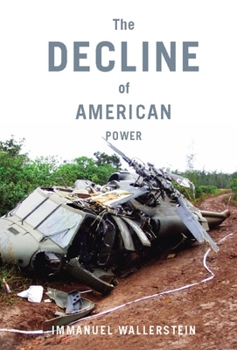The Decline of American Power: The U.S. in a Chaotic World
Select Format
Select Condition 
Book Overview
The internationally renowned theorist contends that the sun is setting on the American empire in this "lucid, informed, and insightful" account (The New York Times). The United States currently finds itself a] superpower that lacks true power, a world leader nobody follows and few respect, and a nation drifting dangerously amidst a global chaos it cannot control. The United States in decline? Its admirers and detractors alike claim the opposite: America is now in a position of unprecedented global supremacy. But in fact, Immanuel Wallerstein argues, a more nuanced evaluation of recent history reveals that America has been fading as a global power since the end of the Vietnam War, and its response to the terrorist attacks of 9/11 looks certain to hasten that decline. In this provocative collection, the visionary originator of world-systems analysis and the most innovative social scientist of his generation turns a practiced analytical eye to the turbulent beginnings of the twenty-first century. Touching on globalization, Islam, racism, democracy, intellectuals, and the state of the left wing, Wallerstein upends conventional wisdom to produce a clear-eyed--and troubling--assessment of the crumbling international order. " Wallerstein's thought] provides a new framework for the subject of European history . . . it is compelling, a new explanation, a new classification, indeed a revolutionary one, of received knowledge and current thought." --Fernand Braudel
Format:Paperback
Language:English
ISBN:1565847997
ISBN13:9781565847996
Release Date:August 2003
Publisher:New Press
Length:324 Pages
Weight:0.77 lbs.
Dimensions:0.9" x 5.2" x 7.4"
Customer Reviews
2 ratings
Great book, a must read for every american.
Published by Thriftbooks.com User , 17 years ago
Great book. It chronicles several historical events that suggests american power weekening because of its militarist (military industrial complex). I bought this book for a class in college. it was interested to get a different view of world events and american exploits abroad.
Useful study of capitalism's absolute decline
Published by Thriftbooks.com User , 20 years ago
Wallerstein is a Senior Research Scholar at Yale University. He analyses the absolute decline of the capitalist world-economy, from its genesis in 1450 through its development to its current `period of terminal crisis'. We now endure economic stagnation, political instability and social pathologies. He points out that there is no escape from class struggle, internally between those for and those against a more democratic and egalitarian society, externally between those defending nations' sovereignty and those upholding the imperial `right to intervene'. He has some dazzling insights - "The idea that leaders sell out, just like the idea that the masses are falsely conscious, seems to me analytically sterile and politically disabling." But there are weaknesses too, as when he focuses on the `left' and on `anti-systemic movements', rather than on the mass, on the necessity for every country to develop workers' nationalism, to control speculative flows of capital and labour. Workers are the immense majority in the world. Migration from rural areas into labour markets has enabled capitalists to relocate, particularly to China. But the world is running out of new sources of cheap labour, and within a generation the new workers learn how to organise for better wages. So wage levels are rising as a percentage of production costs, averaged across the world. Also, taxes to pay for health, education and welfare are rising. Higher wages and taxes squeeze global profits, threatening capitalists' ability to accumulate capital, especially from industrial production. So the USA is a colossus with feet of clay. Its economy is faltering, and it cannot use its military muscle to shape the world the way it wants. Unable to prevail over China and Korea, defeated by Vietnam, it is now trapped in the quagmire of Iraq. Wallerstein concludes, "In the history of the world, military power has never been sufficient to maintain supremacy. Legitimacy is essential, at least legitimacy recognised by a significant part of the world. With their preemptive war, the American hawks have undermined very fundamentally the U.S. claim to legitimacy. And thus they have weakened the United States irremediably in the geopolitical arena."






